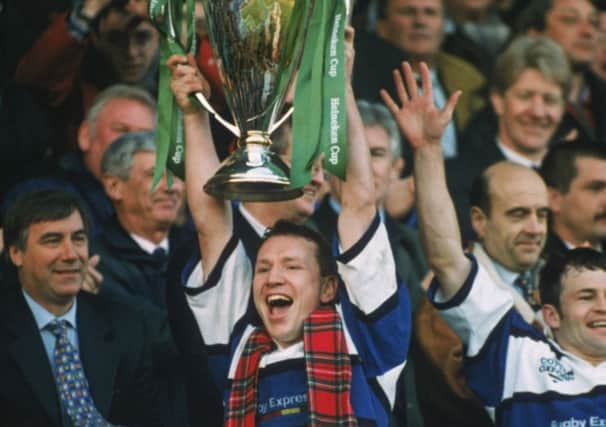Scottish clubs drink to Heineken Cup last orders


Since he also led Scotland to a Calcutta Cup victory two years later, that makes for a pretty fine double: the Heineken in one hand, the Calcutta in the other. The reason why his record will not be matched is, of course, that this is the last year of the Heineken, at least as we know it. At the instigation of the English and French clubs, it will be replaced by a new tournament next year, three tiers instead of two, with all clubs qualifying on merit, or by performance, rather than by pre-ordained right.
We fought hard to retain the Heineken in its existing form, partly because it suited us, partly because of the manner in which the English clubs went about seeking a change, selling the TV rights to their matches without consulting the other unions and hence the clubs they would be playing against. Our position was that the Heineken wasn’t broken, so there was no need to fix it. However, the big battalions insisted that even if it wasn’t broken, its format was unfair and unsatisfactory. As is usually the case, power and money, or the power of money, won the day. Sad perhaps, but there it is.
Advertisement
Hide AdAdvertisement
Hide AdThe Scottish record in the Heineken has been pretty dismal. We can’t deny that. Consequently we were on weak ground in trying to defend our right to have both our pro clubs automatically included in the tournament. Edinburgh have reached one quarter-final and one semi-final. Glasgow have never made the knock-out stages. Now there is to be qualification from the RaboDirect 12 league, and as things stand at present, Glasgow will qualify for next season’s top tier of 20 clubs, while Edinburgh will have to be content with a place in the second-tier competition. It has to be said that they don’t deserve any better. They have been poor this season, and their feeble performance in Treviso last Saturday suggested that any hints of improvement recently were a bit deceptive.
There was a lot to irritate one about that match, not least of course Edinburgh’s failure to score tries even when they had put themselves in a good position to do so. This has, of course, been a Scottish failing for years. No Scottish player has scored as many as 25 international tries. Compare that with the tallies of Brian O’Driscoll or Shane Williams. In Treviso, admittedly, it wasn’t only the Scots in the Edinburgh side who mucked up try-scoring opportunities. The South African flanker, Cornel du Preez, perhaps the best of the club’s numerous imports from the Southern Hemisphere, chose to ignore a three-to-one overlap, and go himself, only to be tackled well short of the line.
It may, however, be no bad thing for Edinburgh to find themselves in the second-tier competition next year. Relegation is not always damaging. It can enable a club to take stock and, by playing more matches against somewhat weaker opposition, develop the habit of winning. This might then be carried over into the Rabo (or whatever that league is called next year).Edinburgh’s coach, Alan Solomons, assures us he is building a club, not just a team; the second -tier competition will give him a chance of proving as good as his word. There are good young Scottish players in his squad who need the experience of winning in competitive matches to become better.
Glasgow are in a happier position. They have almost certainly already qualified for the Heineken replacement and are in a position to reach the knock-out rounds of the Rabo league as they did last season. Yet there is a mystery about their performance. Though they play, or try to play, an expansive game, with pace and off-loading, they have not been scoring many tries.
Indeed only Zebre, bottom in the league, have scored fewer points than Glasgow (271 to Glasgow’s 277) and nobody has scored fewer bonus points than Glasgow’s three. The Ospreys, one point ahead of Glasgow in the table, have notched up ten bonus points. Admittedly, Glasgow have two games in hand but, if the bonus points record was reversed, they would already be all but assured of a knockout place.
Doubtless, the number of matches played on miserably wet, cold and windy Friday evenings at Scotstoun may to some extent account for the shortage of tries, but then most of their rivals have played games in similar conditions this year and still managed to notch up some four-try victories.
More often than not, it has been Glasgow’s sound defence which has enabled them to win close games, but if they are to make progress and enjoy some success in the top tier of the Heineken replacement, they must surely rid themselves of the self-doubt or modesty that seems to come over Scottish teams and players in sight of the try-line.